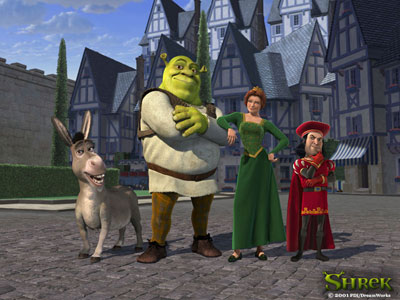
Shrek © 2001 DreamWorks LLC.
This article in the June 2005 issue of Wired Magazine site is sad. It seems to provide yet more evidence that DreamWorks Animation SKG is more concerned about quantity than quality.
Though not a religious fellow, I quite enjoyed The Prince of Egypt and I thought The Road to El Dorado was a wondrous ride into adventure. Sinbad: Legend of the Seven Seas had a lot of the excitement of an old Ray Harryhausen film, and Shrek took the workings of the animaton industry and spoofed it well up on the silver screen. However, a lot of content in DreamWorks Animation SKG films rely on modern-day or past pop-cultural references and movie star voice narration. Yet Katzenberg seems to want to fashion the studio after Walt Disney's dream factory, where films are remembered long after they've been produced. Okay, Okay, before all the straight-to-video stuff hit the market. If you look at the Katzenberg-era produced Disney films, they too contain pop-culture references and superstar voices (Aladdin, The Lion King), yet pre-Katzenberg ones do not contain any, or very little.
What happens when a production relies on these references is that it dates the films; making it necessary for the audience to understand the time period to grasp the humor. 20 years from now, will Shrek 2 be as memorable as Pixar's Finding Nemo? Likely not. Sure it will still look great, but repeated playability won't be the same between the studio's films. Pixar Animation Studios may not turn out the quantity of films that DreamWorks does, but they focus on their story, leaving the pop-culture references to the music for trailers and end credits. DreamWorks Animation SKG would argue that the use of 'pop' helps the audience relate more, and that's certainly true for today's audiences, and in some cases, a portion of the future ones, but not for all down the road. Pixar's films are solid performers at the box office, and almost even better on DVD and home video sales. The fact that they don't need to rely on the pop-culture references demonstrates that they have taken the time to ensure a solid tale before a solid sale. Their films will still be doing well financially many years after their theatrical distribution.
From my humble opinion (as well as others around the web), I believe there needs to be less of the managerial hands-on approach to the production at DreamWorks Animation SKG. An environment needs to be created that supports the collaboration of artists, but also one that allows for growth and courting of talented storytellers, whose visions are trusted within the ranks. While this may affect short-term financial gain at the theaters, it would ensure a long shelf-life in terms of the home viewing market. It would also allow for the belief in the studio, and retention of talent, helping animators, directors, and writers solidify their decision to stay. One can glean information that there are many talented people who have left DreamWorks Animation, yet try to find the same number of departures at Pixar...the numbers don't seem to compare.
DreamWorks Animation has produced enough hits that they're not going anywhere and with the company now in the hands of shareholders who are primarily concerned about one thing, profits mean more now for DreamWorks than ever. By contrast, Pixar is a shareheld company, and they and their shareholders seem to be doing fine, with the studio producing far less films. Of course it could be argued that Pixar has a more complex marketing and distribution agreement with Disney which affects the financial bottom line and they could end up making more or less were they to do all the work themselves as DreamWorks does. The general consensus, however, is that it is The Walt Disney Company reaping the benefits from Pixar's hard work and not the other way around, so it would seem the Pixar shareholders could benefit even more if a more suitable agreement was in place.
Additionally, other animation studios haven't caught up to the 'Big Three' (Disney, Pixar, and DreamWorks) but as we progress further into digital creation and distribution, cutting production costs, it will be easier for competitors to gain footing. The animation industry has been in a transition phase between strictly 2D, to 2D combined with 3D, to full-3D production, where competitors like Warner Bros. and Fox have tried, and in some cases failed (Warner Bros. and Nickelodeon still manage to produce animated films that do well though), to capture animated box office returns the size of Pixar's. Even PDI, a smaller animation company who collaborated with DreamWorks on Antz had its remaining shares snatched up by the big studio, eliminating possible competition and talent defection. Pixar has been fortunate enough to retain its talent, continue making hit after hit, and fend off merging with Disney. They're now at the point where they can dictate the terms of a new distribution agreement instead of the other way around. Yet all of this is nothing without a good story and good storytellers.
As with anything, there will ultimately be a change within DreamWorks, as there will probably be one at Pixar someday. The difference is that Pixar's creative transition will probably be one based on proven storytelling and collaborative leadership, whereas DreamWorks Animation's evolution may be based on management structure or financial matters, and that's definitely not how it should be when it comes to creative work. I think that an external promotion for DreamWorks Animation SKG would really be a good thing, allowing Katzenberg to step back (even if he doesn't want to) and focus on the financial segment, letting a talented, creative leader focus on the stories. As animators, storytellers, and fans, we can hope that the great studio that DreamWorks Animation SKG really can become, shapes up to be one where all residents of the animation kingdom can live happily ever after.
No comments:
Post a Comment